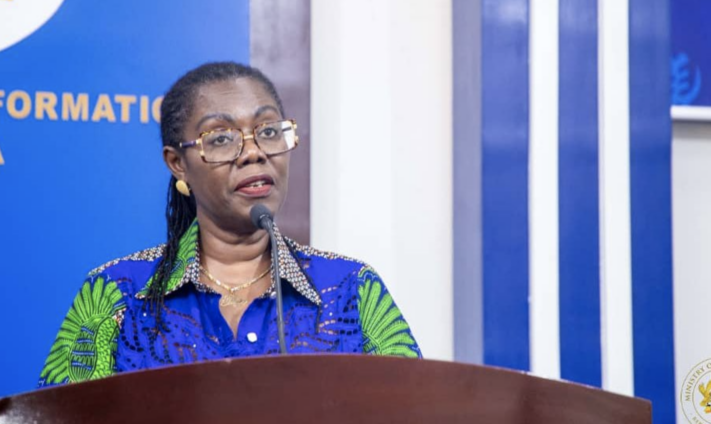The Minister of Communications and Digitalisation, Ursula Owusu-Ekuful, on Thursday, launched Ghana’s Digital Economy Policy and Strategy to guide the implementation of the country’s technological advancement and consolidate the gains made.
The policy aims to leverage digital technologies to foster economic growth, improve public service delivery and ensure equitable access to digital resources.
At a media briefing in Accra to launch the policy document, Mrs Owusu-Ekuful highlighted the transformative power of digitalisation to the national economy, noting that access to digital technologies and services was no longer a luxury for the privileged few, but a human right.
The Minister mentioned the expansion of a high-speed e-Government network connecting 951 public institutions, backed by 3,500 kilometres of fibre optic cables laid in 2023 as a key milestone in bridging the digital divide.
She further stated that the Government was laying the groundwork for a digitally inclusive future, ensuring that every Ghanaian benefits from the opportunities of the digital era.
Madam Owusu-Ekuful highlighted five specific key areas of focus including entrepreneurship, digital skills, digital government, universal access, and emerging technologies, to deepen Ghana’s economic base.
She believed that the policy documents if fully implemented, would promote an ecosystem in which digital technology could drive inclusive growth and open opportunities for both individuals and companies.
Additionally, she said, the Government’s strategy was to leverage digital technologies to address Ghana’s present and future needs.
By aligning digital efforts with job creation and Gross domestic product (GDP) growth, she said, the policy would ensure that technology becomes a powerful tool for inclusive development, poverty alleviation and enhancing prosperity for all citizens.
“Through digital technologies, we are confident of seeing significant progress in entrepreneurship and efficient public service delivery,” Mrs Owusu-Ekuful stated.
The Minister acknowledged the support of key partners, including the World Bank and the Tony Blair Institute for Global Change in putting the policy documents together.
The Minister appealed for greater collaboration across various sectors of the economy to address connectivity gaps.
She reiterated the need for adaptive regulation to foster innovation and protect the citizens from risks such as fraud and misinformation while positioning Ghana as a leader in Africa’s digital future.
Latest Stories
-
Trump signs executive order extending tariff deadline to August 1
3 hours -
Midweek misery to Friday freedom: A personal journey through Ghana’s new holiday reform
3 hours -
We’re streamlining the galamsey fight, too many are running helter skelter – Mahama
3 hours -
Mahama attributes cedi stability to reforms in gold trading sector
3 hours -
Police arrest key suspect in motorbike theft ring in Accra
3 hours -
Journalists urged to drive urban health awareness through data-driven, science-based storytelling
5 hours -
KNUST Optometry 8th White Coat Ceremony tackles refractive error setbacks to improve access
5 hours -
I’m devastated – Akufo-Addo mourns Akwatia MP Ernest Kumi
5 hours -
IMF Executive Board approves $370m disbursement for Ghana
5 hours -
Castel Group acquires GGBL
5 hours -
Mr. President, your Six-Pillar 24H+ Economic Policy is shaky
5 hours -
T-bills auction: Undersubscription to continue in coming weeks; government misses June 2025 target by 19%
5 hours -
FUND24, the weakest pillar of Ghana’s 24H+ economy: APL cautions President Mahama
5 hours -
Ghana’s tourism picks up in 2024, but cost still a big issue
5 hours -
EKAJ Educational Fund partners UCC to train local artisans to improve standards
5 hours

